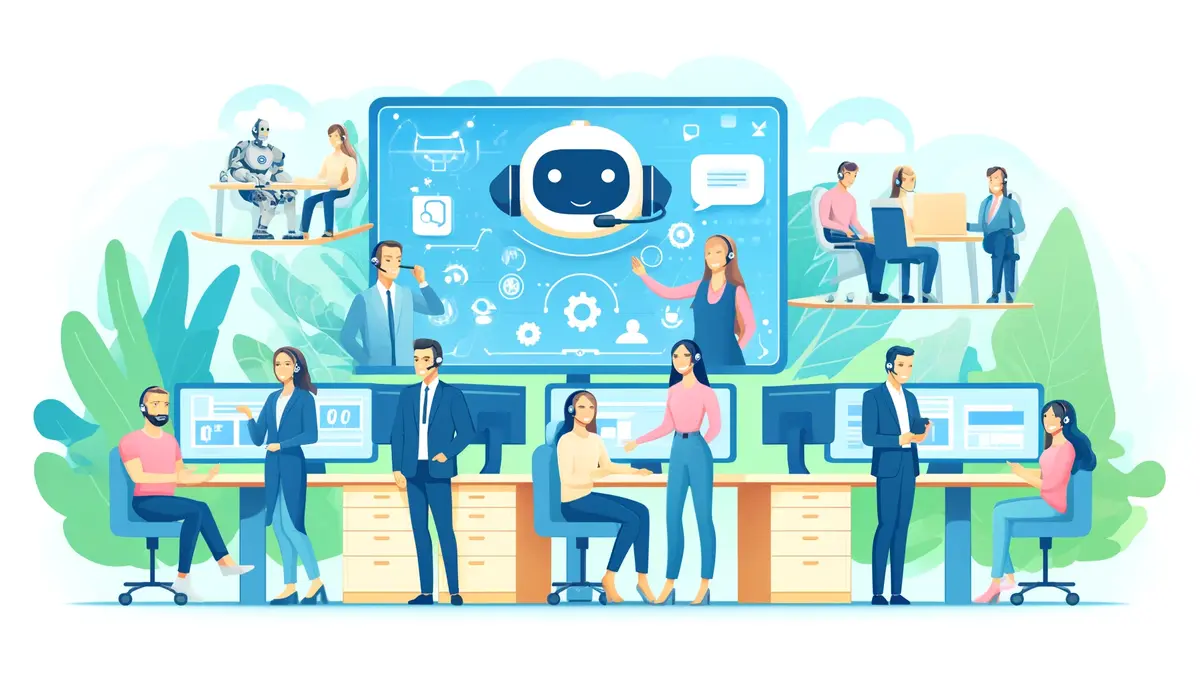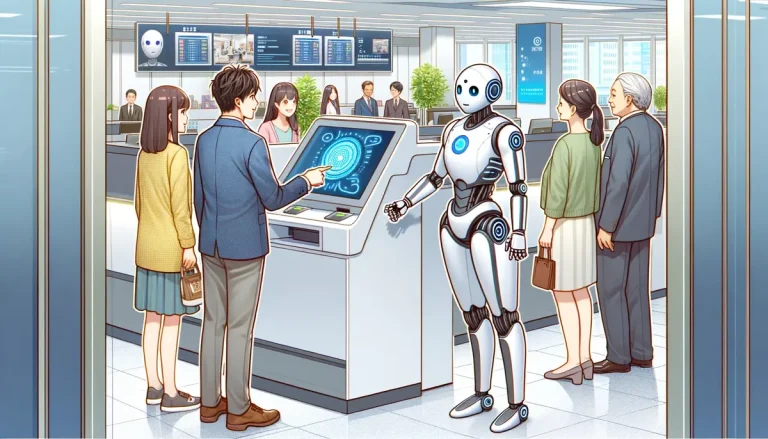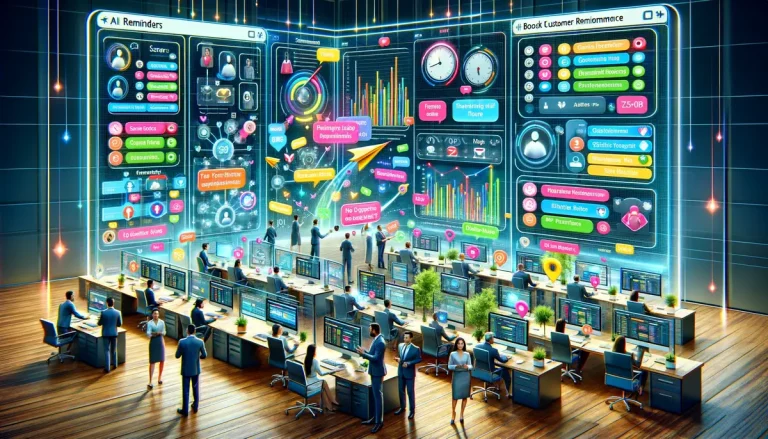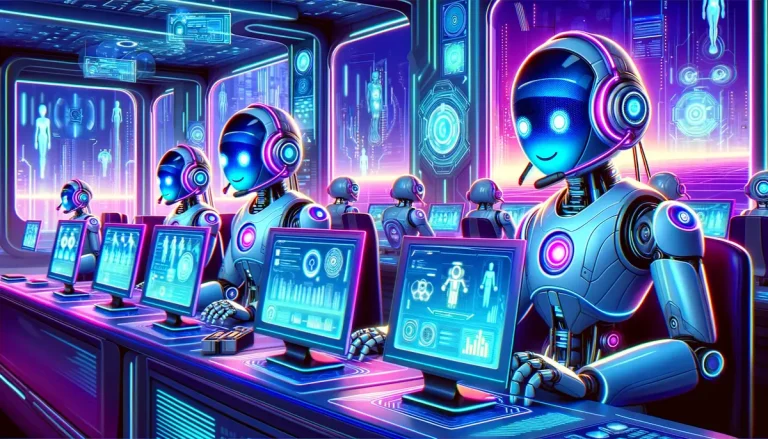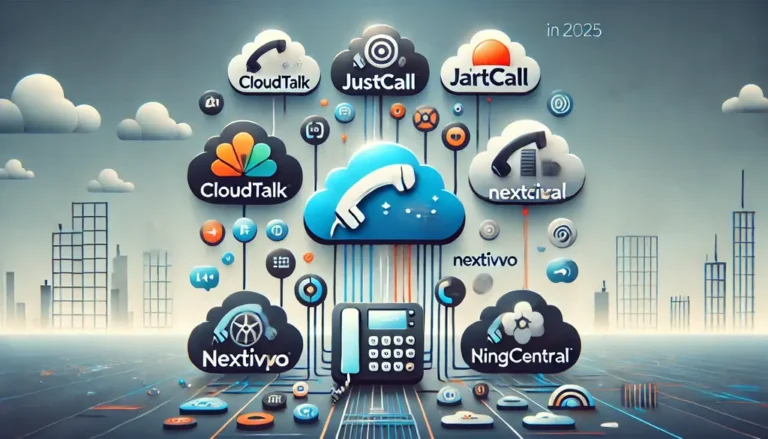Imagine calling a customer service line and being greeted by an AI that not only understands your query but can predict your needs based on your previous interactions. This is not science fiction. This is the future of customer service.
Nearly 50% of support professionals believe that customer experience improves when AI-human collaboration. This staggering statistic highlights the potential of AI-human collaboration in modern call centers.
As technology continues to advance, this interaction offers more benefits, enhancing efficiency and customer satisfaction. Let’s now explore what this AI-human collaboration brings.
Care to save 90% of your call center costs?
Learn More Here
What AI Does in Modern Call Centers?
AI in call centers has already started revolutionizing how businesses manage customer interactions. AI allows human agents to focus on more complex and personalized interactions, while it automates routine tasks. This AI-human synergy leads to improved customer experience. Now, let’s look deep into how AI is reshaping call centers.
What are Some AI Functionalities?
Here are some common functionalities of AI:
- Chatbots: Available 24/7, chatbots handle common queries, reduce wait times, and provide instant responses. They can answer FAQs, track orders, and even troubleshoot basic issues, ensuring customers receive immediate assistance. For instance, chatbots can help with resetting passwords, checking account balances, and providing shipping updates.
- Virtual Assistants: These assistants help with scheduling appointments, retrieving information, and guiding customers through processes. They act as a bridge between customers and human agents, ensuring seamless service. Virtual assistants can handle tasks like booking flights, scheduling doctor’s appointments, and providing technical support.
- Predictive Analytics: By analyzing customer data, AI can predict future behavior and personalize interactions. This predictive capability helps businesses anticipate customer needs and tailor their services accordingly. Predictive analytics can identify trends, such as increased demand for certain products or services, and help businesses prepare accordingly.
What are Some Benefits of AI in Call Centers?
While there are loads of benefits of AI in call centers, here are a few we listed:
- Efficiency: AI automates repetitive tasks, freeing human agents to handle more complex issues. This division of labor leads to quicker resolution times and higher productivity. For example, AI can handle initial customer queries, gather necessary information, and then transfer the call to a human agent with all relevant data, saving time and effort.
- Data Insights: AI tools provide real-time data analysis, giving agents valuable insights into customer behavior and preferences. This information helps agents offer personalized solutions. By analyzing customer interactions, AI can identify common issues and suggest improvements to enhance customer service.
- Cost Reduction: With AI handling routine tasks, businesses can reduce their operational costs by minimizing the need for a large human workforce. AI can handle multiple queries simultaneously, reducing the need for additional staff during peak times.
How Important Human Agents are for Call Centers?
Despite the numerous advantages of AI, the human touch remains irreplaceable in customer service. Human agents bring empathy, creativity, and critical thinking to the table, offering a level of service that AI cannot replicate.
- Empathy: Human agents can understand and relate to customer emotions, building rapport and trust. They can diffuse tense situations and provide comfort, something AI struggles to achieve. For example, a customer calling with a complaint about a defective product may feel frustrated. A human agent can empathize with the customer’s situation, apologize, and offer a solution, making the customer feel heard and valued.
- Complex Problem-Solving: Human agents excel in handling nuanced and multifaceted issues that require critical thinking and creativity. They can adapt to unexpected situations and come up with innovative solutions. For instance, a customer with a unique issue may require a tailored solution that an AI may not be able to provide.
- Personal Interaction: Many customers prefer speaking to a human, especially for sensitive or complicated matters. The personal touch human agents provide can make a significant difference in customer satisfaction. For example, a customer dealing with a billing error may prefer to speak with a human agent who can listen to their concerns and provide a detailed explanation.
The AI-Human Collaboration
The AI-human collaboration creates a powerful combination, enhancing overall performance and customer satisfaction. By leveraging the strengths of both, businesses can provide superior customer service.
Support for Human Agents
- Reduced Repetitive Tasks: AI handles routine queries, allowing agents to focus on complex cases. This reduces burnout and increases job satisfaction among agents. For instance, AI can handle tasks like data entry and appointment scheduling, freeing human agents to handle more engaging and challenging tasks.
- Data Insights: AI provides agents with valuable customer data, helping them tailor their responses. With access to detailed customer histories and preferences, agents can offer more personalized and effective solutions. AI can analyze customer interactions to identify patterns and suggest personalized recommendations.
- Enhanced Decision-Making: AI tools assist agents in making informed decisions quickly. By analyzing vast amounts of data, AI can suggest the best course of action, enabling agents to resolve issues efficiently. For example, AI can analyze customer feedback and suggest improvements to enhance customer service.
Training and Upskilling
- Training Programs: Equip agents with the skills to work alongside AI. Comprehensive training programs ensure that agents understand how to leverage AI tools effectively. For example, training programs can teach agents how to use AI tools to analyze customer data and provide personalized solutions.
- Continuous Learning: Encourage ongoing education to keep up with technological advancements. Regular workshops and training sessions help agents stay updated with the latest AI developments. For instance, workshops can cover topics like AI ethics and best practices for using AI in customer service.
Companies like Amazon and American Express use AI to enhance human agent performance, resulting in higher customer satisfaction and efficiency. These organizations have successfully integrated AI into their customer service operations, demonstrating the potential benefits of this synergy.
For instance, Amazon uses AI to analyze customer interactions and provide agents with real-time data, helping them offer personalized solutions.
Benefits of AI-Human Collaboration
The AI-human collaboration in call centers offers numerous benefits, enhancing customer service and operational efficiency.
- Improved Customer Satisfaction: Faster response times and personalized service lead to happier customers. By combining the strengths of AI and human agents, businesses can provide a superior customer experience. For instance, AI can handle routine queries, while human agents can provide personalized solutions, ensuring that customers receive the best possible service.
- Enhanced Efficiency: Streamlined operations reduce wait times and operational costs. AI handles routine tasks, allowing human agents to focus on more complex issues, increasing overall efficiency. For example, AI can handle initial customer queries, gather necessary information, and then transfer the call to a human agent with all relevant data, saving time and effort.
- Increased Employee Satisfaction: Human agents experience less burnout by focusing on more engaging tasks. The reduction of monotonous tasks leads to higher job satisfaction and retention rates. For instance, AI can handle repetitive tasks, allowing human agents to focus on more challenging and rewarding tasks, improving their job satisfaction.
What are Some of the Top Challenges?
With pros, there comes several challenges as well. Businesses thinking to integrate AI into their call centers, must address the potential AI-human collaboration challenges that may come around.
- Job Displacement: Concerns about AI replacing human jobs must be managed. Businesses should focus on reskilling and upskilling employees to ensure they can work alongside AI. For instance, training programs can teach employees how to use AI tools effectively, ensuring they remain valuable assets to the company.
- Ethical Considerations: Ensure AI is used ethically, maintaining transparency and accountability. Establishing clear guidelines and protocols helps prevent misuse and builds trust with customers. For example, businesses should ensure that AI tools are used to enhance customer service, rather than replace human agents entirely.
- Smooth Integration: Implement strategies for seamless integration, such as phased rollouts and continuous feedback. Involving employees in the integration process and providing ongoing support ensures a smoother transition. For instance, businesses can implement AI tools gradually, allowing employees to adjust to the new technology and provide feedback on its effectiveness.
What is the of AI-Human Collaboration in Call Centers?
The future of AI-human integration in call centers is promising, with emerging technologies set to further transform the industry.
- Emerging Technologies: Innovations like natural language processing (NLP) and advanced machine learning will enhance AI capabilities. These technologies will enable AI to understand and respond to customer queries more accurately and naturally. For example, NLP can help AI tools understand customer queries more accurately, while advanced machine learning can improve AI’s ability to predict customer needs and provide personalized solutions.
- Evolving Roles: Human agents will increasingly focus on high-value tasks, supported by advanced AI tools. As AI takes over routine tasks, agents will be free to engage in more strategic and complex activities. For instance, human agents can focus on building relationships with customers and providing personalized solutions, while AI handles routine queries and data analysis.
- Enhanced Customer Experience: Continued integration will lead to even more personalized and efficient customer service. The AI-human collaboration will result in faster, more accurate, and more satisfying customer interactions. For example, AI can handle routine queries, while human agents can provide personalized solutions, ensuring that customers receive the best possible service.
Care to save 90% of your call center costs?
Learn More Here
Conclusion
The AI-human collaboration in modern call centers is not just a trend but a necessity. This interaction enhances efficiency, improves customer satisfaction, and creates a more engaging work environment for human agents.
By leveraging the strengths of both, businesses can navigate the complexities of customer interactions, ensuring satisfaction and loyalty.
The journey towards a fully integrated call center is ongoing, but the benefits are clear: a harmonious blend of technology and human touch, driving the industry forward.

